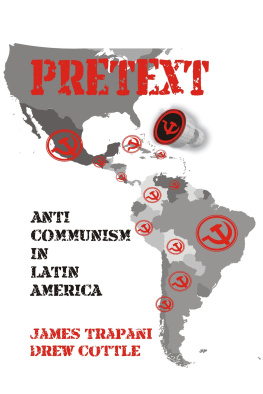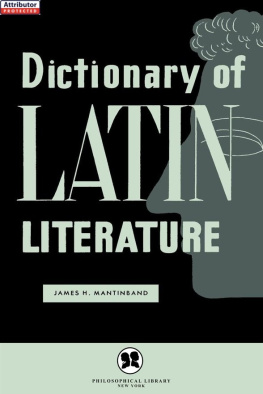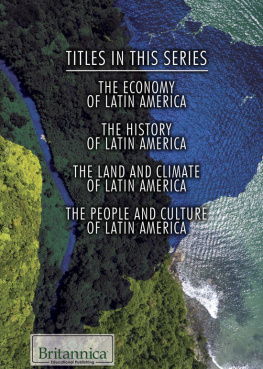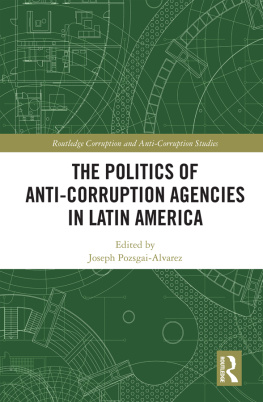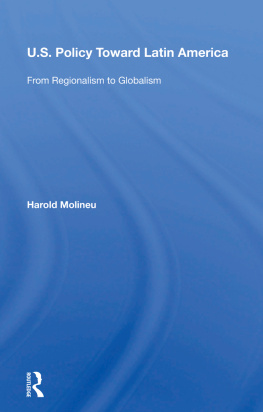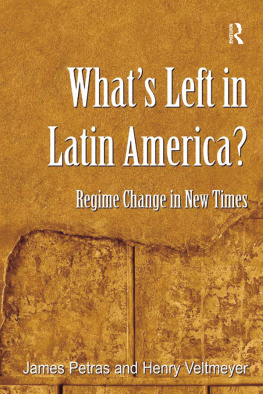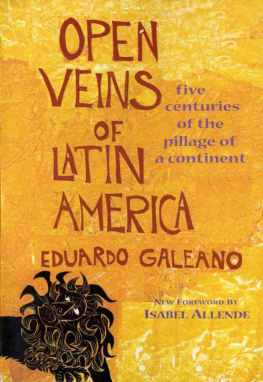Published by
Vij Books India Pvt Ltd
(Publishers, Distributors & Importers)
2/19, Ansari Road
Delhi 110 002
Phones: 91-11-43596460, 91-11-47340674
Mob: 98110 94883
e-mail:
web:www.vijbooks.com
Copyright 2020, James Trapani & Drew Cottle
ISBN: 978-93-89620-36-8 (Hardback)
ISBN: 978-93-89620-37-5 (ebook)
All rights reserved.
No part of this book may be reproduced, stored in a retrieval system, transmitted
or utilized in any form or by any means, electronic, mechanical, photocopying,
recording or otherwise, without the prior permission of the copyright owner.
Application for such permission should be addressed to the publisher.
The views expressed in this book are of the author in his personal capacity.
The Cold War struggle against the perceived enemy of communism dominated the politics of every Latin American republic for a generation. Between 1948 and 1990, the fear and hysteria surrounding communism, and the foreign policy of the USSR, impacted every election, revolution, military coup, and internal conflict in twenty individual Latin American republics. This was based upon the premise that communism could, and potentially would, overtake the region and impose tyrannical authority to the detriment of the great majority. This book will demonstrate that this premise was in fact a pretext. The leaders of the United States created a prolonged era of paranoia based upon exaggerated and fabricated communist threats throughout the hemisphere, beginning in the 1920s and continuing throughout the era of the Cold War. In doing so, they characterized a generation of social democratic reformers as a part of the monolithic, and foreign, global movement for communism and Soviet global domination. As this pretext continued to grow, by the 1960s, all debate over whether communism was the regional ideological enemy ceased. Rather, debate turned to how to contain the so-called insurgencies that threatened the status quo with violent revolution. In the absence of the substantial liberal and economic reform proposed by the social democratic, and other populist, politicians, the region became increasingly unstable and polarised between the status quo of social conservatism and neoliberal service to the American led global capitalist economy. Few thought to question what created these insurgencies. This pretext shaped Latin American politics for the duration of the global Cold War despite its political, economic and geographic distance from the Soviet led world.
This ideological Cold War has obscured the analysis of democratic movements of the Americas. This book will trace those movements for social democracy within the Mexican Party of the Institutionalized Revolution (PIR), the Peruvian American Popular Revolutionary Alliance (APRA), the Venezuelan Democratic Action Party (AD), the Colombian Nationalist Leftist Revolutionary Union (UNIR) and leftist faction of the It is evident that the Latin Americans were coming from a less developed base than Europe. The fundamental social problem of inequality was entrenched and causing agitation between the dictatorships, the oligarchs and the masses. There was no single theorist that determined this philosophy of social democracy. Rather, it became a framework for anti-dictatorial struggle and the formation of populist coalitions to fill their post-revolutionary voids, which claimed to create more equitable and developed societies. This came at the expense of the ruling oligarchs and foreign capital, setting the stage for the Latin Americas unique Cold War, which was distinct from the global conflict between communism and capitalism.
Anti-communism emerged in the North American psyche immediately after the 1917 Russian Revolution. President Woodrow Wilson declared that Bolshevism represented the antithesis of everything he believed in. The social democrats were, in most cases, anti-imperialists and economic nationalists which confronted foreign investment to support their populist coalitions. By the 1940s, the US were the greatest imperialists in their region. The redistribution of both income and capital goods was central to the social democratic coalitions for power. The redistribution of income was performed through increased taxation on the domestic oligarchs and foreign corporations. That income returned to the people in the form of social security, increased wages, and programs for health and education. The redistribution of capital goods was also undertaken by several of the social democratic leaders. Most common were the measure of nationalization of subsoil rights and the redistribution of land which was seized from peasants and sold to foreign corporations during the first decades of the twentieth century. These actions hindered the capitalist expansion of the US from the 1920s onwards, as it made small Latin American nations increasingly self-sufficient. It also negatively impacted those US citizens that owned the land and subsoil rights. This gave the US a motive to oppose economic nationalism from the early twentieth century.
The anti-communist pretext began within the US during 1919. Leffler argues that American politicians would brand their enemies as communists despite no detailed knowledge of the doctrine, or of events in Russia.
A New World in the service of the Old
The political origins of the Latin American republics are based upon their colonization and the conflicts for their independence. In Spanish America, a European elite of conquistadors ruled over a predominate Indigenous and mestizo population. Their role was to exploit the natural wealth of the hemisphere by commodifying agricultural, mineral and light manufactured products. In a land of plenty Eduardo Galeano states that, Latin America continues to exist at the service of others needs. That level of control was required to produce the goods demanded in the North Atlantic, and to monopolize wealth.
The creole oligarchs diverged into two great camps following their independence from Spanish rule. The intellectual and political traditions of Latin America have often been defined through the polarization of Liberal and Conservative Parties. While their coalition against progressive ideologies is more significant than their opposition, it is relevant to define the two positions. Woodward defines Latin American conservatism as a reaction to radical philosophies that emerged in nineteenth century Europe.
Latin American liberalism originated from within European thought. Fawcett defines liberalism as the belief, that societies were constantly evolving with a specific emphasis on peoples rights, toleration, constitutional government, the rule of law, and liberty. Hence, when it is said that the principle conflict in Latin American politics was between liberalism and conservatism, the statement concerns economic theories rather than progressive notions of egalitarianism. That would not materialize until the twentieth century.
Despite this ideological divide between members of the oligarchy, nineteenth century politics was mostly undemocratic. The landowning oligarchic class, both conservative and liberal, influenced government policy for personal economic and political gain.
A Rising Star in the North
The British established a settler society along the Eastern coast of North America during the seventeenth century that was fundamentally different By 1848, the US had announced itself to the region.


